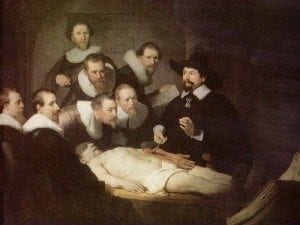See For Yourself
It has been quite some time since I attended an autopsy.
Many doctors have vivid memories of their first tentative steps into the dissection halls of the anatomy class and their first anxiety-ridden attendance at an autopsy. Such moments are among the fabled rituals of burgeoning doctor-hood.
I remember and value the autopsy as the time when the dead truly teach the living. Indeed, autopsy literally means “to see for yourself”. I learned far more as a student spending early morning sessions in the autopsy room, than from the endless monotonous preachings of the lecture hall. From my most memorable teacher, forensic pathologist Tim Koelmeyer, I learned that our greatest clinical predecessors, including William Osler and Herman Boerhaave, perfected their knowledge by correlating the changes they saw for themselves in the dead with the clinical presentations of their patients while still alive.
A disease which is new and obscure to you, Doctor, will be known only after death; and even then not without an autopsy will you examine it with exacting pains
Hermann Boerhaave: Atrocis, nec Descripti Prius. Morbi historia. Translated in Bull Med Lib Assoc. 1955; 43:217
Sadly, the autopsy has withered and, in many cases, died as a teaching tool for medical students and practicing doctors. For instance, at my own former medical school in Auckland:
…in early 2002, students were banned from attending coronial autopsies under an interpretation of New Zealand’s Coroners Act. The decision was made in the environment following widespread media coverage of the discovery that children’s hearts removed at autopsies had been retained for teaching without the family’s consent in past decades.
O’Grady G. Death of the Teaching Autopsy. BMJ 2003;327:802-803
This was such a shame and such a waste. I still believe that the autopsy is an important quality control and learning tool in medicine. Indeed, about a quarter of the time an autopsy reveals something completely unexpected, even if not necessarily the “cause of death”. The family of the deceased need not fear the autopsy, and when approached with empathy and counseled appropriately it may even help them achieve a degree of closure.
Mortui vivos docent – “The dead teach the living”
PS. “Pathguy” Ed Frielander describes the autopsy in a typically “no nonsense” and easy to understand fashion.
Chris is an Intensivist and ECMO specialist at The Alfred ICU, where he is Deputy Director (Education). He is a Clinical Adjunct Associate Professor at Monash University, the Lead for the Clinician Educator Incubator programme, and a CICM First Part Examiner.
He is an internationally recognised Clinician Educator with a passion for helping clinicians learn and for improving the clinical performance of individuals and collectives. He was one of the founders of the FOAM movement (Free Open-Access Medical education) has been recognised for his contributions to education with awards from ANZICS, ANZAHPE, and ACEM.
His one great achievement is being the father of three amazing children.
On Bluesky, he is @precordialthump.bsky.social and on the site that Elon has screwed up, he is @precordialthump.
| INTENSIVE | RAGE | Resuscitology | SMACC

